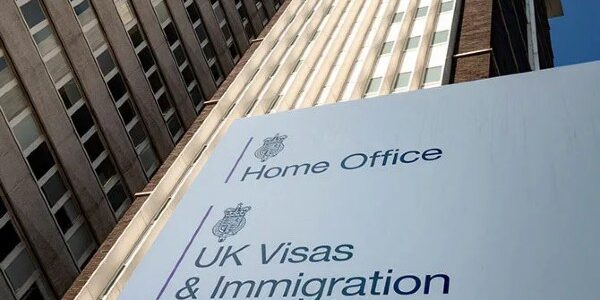
The UK government says it will not grant asylum to persons who have been involved with IPOB, MASSOB or any other violent ‘Biafran’ group.
“Persons who commit human rights violations must not be granted asylum,” the UK government said in an updated migration policy. It added that if the person is excluded from the Refugee Convention, they will also be excluded from a grant of humanitarian protection.

According to the UK Visas and Immigration, “if a person has been involved with IPOB (and/or an affiliated group), MASSOB or any other ‘Biafran’ group that incites or uses violence to achieve its aims, decision-makers must consider whether one (or more) of the exclusion clauses under the Refugee Convention is applicable.”
It noted that IPOB is proscribed as a terrorist group by the Nigerian government, and members of the group and its paramilitary wing – the Eastern Security Network – have reportedly committed human rights violations in Nigeria.

Although MASSOB has not been proscribed or declared a terrorist group by the Nigerian government, it has reportedly been involved in violent clashes with the authorities.
According to the British government, establishing a Refugee Convention reason is not sufficient to be recognised as a refugee.
“The question is whether the particular person has a well-founded fear of persecution on account of their actual or imputed convention reason,” it added.
ALSO READ: UK govt recovers $23m Abacha loot
For an asylum application to succeed, decision-makers must consider each case on its facts, taking into account the legal status, profile, size, and organisation of the group/organisation to which the person belongs and its activities; whether a person in the UK would wish to continue their activism if returned to Nigeria (if not, why not) and whether the group/organisation has a presence in Nigeria as well as outside of the country and any evidence that it is being monitored by the government.
Other considerations include the person’s profile and political activities (including those online) and relevant documentary or other evidence; the profile and activities of family members; past treatment of the person, and evidence that their activities in the UK may have come to the attention of the Nigerian security agencies.
“Decision-makers will also need to take into account whether the person supports and is active on behalf of IPOB, which is a proscribed group in Nigeria, and whether they fear prosecution rather than persecution,” the migration policy states.

“The onus is on the person to demonstrate that they are of interest to the government because of their profile and activities and are at risk of serious harm or persecution.”
IPOB is a separatist group seeking an independent country for the Igbo ethnic group of Nigeria. It formed the ESN in December 2020 as an armed wing to allegedly defend Igbo interests, especially against armed ‘Fulani herders’ whom it accused of attacking Igbo communities and farms.
IPOB was initially unarmed and its members were victims of extrajudicial killings by the armed forces and the police between 2015 and 2016, a PREMIUM TIMES investigation had uncovered.
Since the proscription of IPOB as a “terrorist organisation” by federal court order in 2017, more violent clashes have occurred between the separatists and security operatives.
In one incident in August 2020, the police stormed an IPOB meeting in Enugu and killed 21 members. Two police officers also died in the clash. Following the incident, IPOB called on its members to start practising ‘self-defence.’
The group has been accused of being responsible for the attacks bedevilling the southeast region of the country where dozens of police officers and other security officials have been killed in 2022. It has denied responsibility for the attacks.
Credit:
